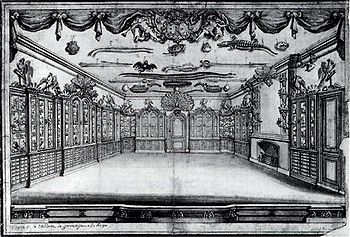
Douwe Sirtema van Grovestins
Encyclopedia

Jonkheer
Jonkheer is a Dutch honorific of nobility.-Honorific of nobility:"Jonkheer" or "Jonkvrouw" is literally translated as "young lord" or "young lady". In medieval times such a person was a young and unmarried son or daughter of a high ranking knight or nobleman...
Douwe Sirtema van Grovestins (Leeuwarden, 1710–Brussels
Brussels
Brussels , officially the Brussels Region or Brussels-Capital Region , is the capital of Belgium and the de facto capital of the European Union...
, February 26, 1778) was a Frisian courtier at the court of stadtholder
Stadtholder
A Stadtholder A Stadtholder A Stadtholder (Dutch: stadhouder [], "steward" or "lieutenant", literally place holder, holding someones place, possibly a calque of German Statthalter, French lieutenant, or Middle Latin locum tenens...
William IV, Prince of Orange
William IV, Prince of Orange
William IV, Prince of Orange-Nassau , born Willem Karel Hendrik Friso, was the first hereditary stadtholder of the Netherlands.-Early life:...
, and later at the court of his widow Anne, Princess Royal and Princess of Orange
Anne, Princess Royal and Princess of Orange
Anne, Princess Royal and Princess of Orange was the second child and eldest daughter of King George II of Great Britain and his consort, Caroline of Ansbach. She was the spouse of William IV, Prince of Orange, the first hereditary stadtholder of the Netherlands...
. He was first Chamberlain
Chamberlain (office)
A chamberlain is an officer in charge of managing a household. In many countries there are ceremonial posts associated with the household of the sovereign....
, later Equerry
Equerry
An equerry , and related to the French word "écuyer" ) is an officer of honour. Historically, it was a senior attendant with responsibilities for the horses of a person of rank. In contemporary use, it is a personal attendant, usually upon a Sovereign, a member of a Royal Family, or a national...
to the stadtholder, and equerry to the Princess after her husband's death.
Douwe was married to Catharina Sindt von Schutz (whose curiocabinet in The Hague is shown in a picture from 1756) and had a son, Lodewijk Idzard Douwe with her in 1749.
After the stadtholder's court moved from Leeuwarden to The Hague during the Orangist Revolution of 1747 at the end of the Second Stadtholderless Period
Second Stadtholderless Period
The Second Stadtholderless Period or Era is the designation in Dutch historiography of the period between the death of stadtholder William III on March 19, 1702 and the appointment of William IV, Prince of Orange as stadtholder and captain general in all provinces of the Dutch Republic on May 2,...
Douwe became very influential in the patronage politics of the regency of the Princess during the first years of the minority of William V, Prince of Orange
William V, Prince of Orange
William V , Prince of Orange-Nassau was the last Stadtholder of the Dutch Republic, and between 1795 and 1806 he led the Government of the Dutch Republic in Exile in London. He was succeeded by his son William I...
. His scandalous dealings for his own profit in public offices (he sold the governorship of the Dutch East India Company
Dutch East India Company
The Dutch East India Company was a chartered company established in 1602, when the States-General of the Netherlands granted it a 21-year monopoly to carry out colonial activities in Asia...
colony of Ceylon in 1756 for 70,000 guilders, for instance) helped put the stadtholderate in bad repute. This brought about his removal from court after the death of Princess Anne in 1759. Nevertheless, he was made a lieutenant-general in the army of the Dutch Republic
Dutch Republic
The Dutch Republic — officially known as the Republic of the Seven United Netherlands , the Republic of the United Netherlands, or the Republic of the Seven United Provinces — was a republic in Europe existing from 1581 to 1795, preceding the Batavian Republic and ultimately...
, and served as governor of the Barrier Fortress Ieper in the Austrian Netherlands in 1774.
Probably because of the fact that he played a central role in the corrupt practices of the regime of the Stadtholderate he also was the subject of widespread rumors that he had had a liaison with Princess Anne, and even fathered the future stadtholder William V. Except for the uncanny family resemblance between himself and William, Anne's biographer Veronica Baker-Smith thinks there is insufficient ground to believe this rumour. She points out that such rumours are being flung about quite casually for political reasons, and that when a pamphlet was published in 1782, alleging William V's illegitimacy, this was in the middle of the Patriot crisis, and the author was clearly a Patriot partisan.
Late in life Douwe became the protector and lover of the early feminist Etta Palm d'Aelders
Etta Palm d'Aelders
Etta Lubina Johanna Palm d'Aelders was a Dutch feminist outspoken during the French Revolution. She gave the address Discourse on the Injustice of the Laws in Favour of Men, at the Expense of Women to the French National Convention on 30 December 1790.-Biography:Etta Aelders was the daughter of...
, whom he apparently taught the skills to set up as a high-class courtesan, and organiser of a political Salon
Salon (gathering)
A salon is a gathering of people under the roof of an inspiring host, held partly to amuse one another and partly to refine taste and increase their knowledge of the participants through conversation. These gatherings often consciously followed Horace's definition of the aims of poetry, "either to...
in pre-Revolutionary Paris.

